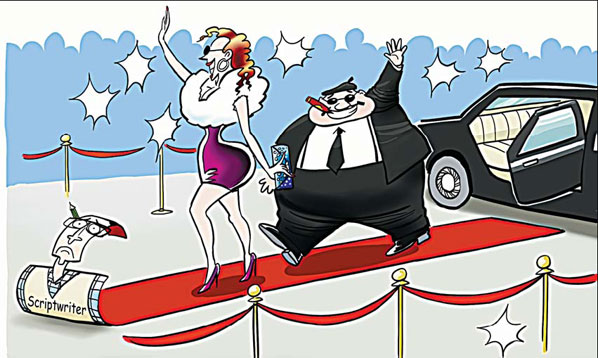Too soon to write them off

Following a lengthy strike, Hollywood writers have just scored a historic victory, yet their counterparts in China are just embarking on the quest to protect some of their most basic rights.
At the recent Chinese People's Political Consultative Conference (CPPCC), writer Wang Xingdong raised a proposal regarding the protection of his fellows' rights of authorship, revision and payment.
Wang also initiated a writers' meeting on Feb 24 in Beijing, which more than 80 writers attended, discussing their livelihoods and how to improve their lot.
Compared to Hollywood writers, who insisted on residual payments for the distribution of their works on new media, Chinese writers are seeking more basic changes.
Li Shuxing was one of the scriptwriters of A Battle of Wits (Mo Gong), a film starring Andy Lau, but the script was attributed to director Jacob Cheung. According to writer Wang Hailing, this is a regular occurrence.
"It is quite common that the acknowledgement of authorship is ignored," he tells China Daily.
Having been a scriptwriter for about 10 years, Wang attributed this disrespect of writers' labors to the marginalization of literature after the late 80s, and some directors' attempts to hog the spotlight.
According to Wang Xingdong, producers also fail to acknowledge writers' contributions because of the media's excessive attention to stars and directors.
"Critics seldom talk about the scripts but focus on directorial work and actors' performances," he says.
Hot writer Shi Kang, who quickly rose to fame through Striving (Fen Dou), a TV series about the lives of young people, says that producers know they can treat writers unfairly because of an oversupply.
"China never lacks writers," he says. "So many are waiting for work. One quits and many will happily step up."
This glut of writers also results in the violation of revision rights.
Most contracts between writers and producers in China now stipulate that producers or directors can revise the script until they are satisfied. Only a few top writers retain full control of their works.
Even though many writers are opposed to this item in their contracts few challenge it because of fierce competition in the industry.
In a recent interview, director A Gan told the Beijing News that many filmmakers have no confidence in the writer's ability, so they hire other writers to improve on the original scripts.
But Wang Hailing says that this shouldn't be a reason for writers to go unpaid. "You don't cancel the pay of a worker just because he or she does not make it perfect. At least you admit he or she did the job," Wang says.
Both Wang Hailing and Wang Xingdong think the first draft writer, or the first person to raise an original idea, should receive more recognition.
"The first person is making something out of nothing, while directors, actors and other crew members are making something out of something," says well-known writer Cheng Qingsong. "The original material's creator should get the credit, so that more will work on original ideas instead of adapting or re-writing, and originality is the hope of the industry."
American writers draw royalties not only from their works, but also the residuals, such as re-broadcasting on DVD and now new media. But Chinese writers usually only receive one payment. And even this sum, compared to American writers, is not very high.
According to the Writers Guild of America, over a five-year period of employment and unemployment, a writer's average income is $62,000 per year. Top writers can earn millions of dollars from residuals and box office royalties.
In China, top writers can earn around 50,000 yuan ($6,900) for a TV episode, while newcomers earn around 4,000 yuan or even less.
Even then, these payments can sometimes be delayed or simply cancelled. At the February meeting, young female writer Wang Yi told how she received a death threat from a producer after she asked for her pay.
Producers, however, have their complaints, too.
"TV stations hold the power," Wang Hailing says. "When they lose out to the TV stations, the show makers take from the writers' wallets, because they would rather not offend the stars or directors."
"In negotiations between writers and producers, writers are the disadvantaged group, but between producers and buyers from TV stations or theater managers, it is the producers who are disadvantaged," Wang adds. "When even the film or TV series producers can not earn residuals, how can writers get a percentage?"
Nonetheless many are striving for an allusive job. Film magazine editor Shao Yan is now working on a story, hoping to break into the industry. He believes the start is hard, but successful ones will win big fame and money. Few writers pursue legal action against studios or corporations when they are bullied. The high cost is one reason, and sometimes they worry about being boycotted in the industry. Besides, they do not have an industry-wide guild as organized as the Writers Guild of America, which keeps original material archived for at least five years as a documentation of authorship, and represents its members in talks with studios and networks. China has no Alliance of Motion Picture and Television Producers, either, so even if writers establish a guild, who will it negotiate with?
What writers can do now, Cheng argues, is to improve their work, while paying attention to their contracts to stop the violation of rights at the first instance.
"If you do not protect yourself first, you only have yourself to blame," he says. "We keep trying to raise society's awareness of the issue. If writers are not well treated , the result is fewer and fewer good works and the decline of the whole industry."
(China Daily 03/27/2008 page18)














